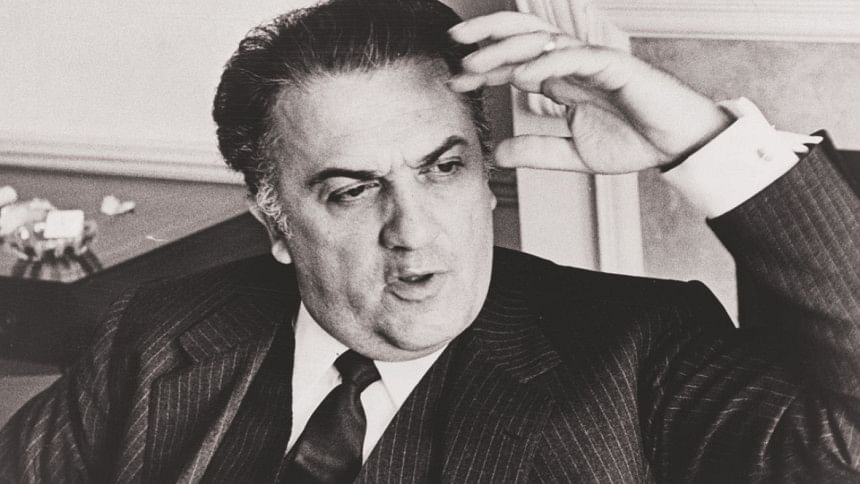Federico Fellini

Fellini was born on 20 January 1920, to middle-class parents in Rimini, then a small town on the Adriatic Sea. He was an Italian film director and screenwriter. Known for his distinct style that blends imaginary and decorative images with coarseness, he is recognized as one of the most dominant filmmakers of all time.
Before reaching twenty, with the assistance of Italy's most popular variety performer Fabrizi, Fellini obtained his first screen credit as a comedy writer. Progressing rapidly to numerous collaborations on films at Cinecittà, his circle of professional colleagues widened. While writing for radio, Fellini met his future wife Giulietta Masina in a studio office at the Italian public radio broadcaster EIAR in 1942. Well-paid as the voice of Pallina in Fellini's radio serial, “Cico and Pallina”, Masina was also well known for her musical-comedy broadcasts which cheered an audience disheartened by the war. In November 1942, Fellini was sent to Libya, occupied by Fascist Italy, to work on the screenplay of “I cavalieri del deserto” (Knights of the Desert). Responsible for emergency re-writing, he also directed the film's first scenes. When Tripoli fell under siege by British forces, he and his colleagues made a narrow escape by flying to Sicily. His African adventure, later published in Marc'Aurelio as "The First Flight", marked “the emergence of a new Fellini, no longer just a screenwriter, working and sketching at his desk, but a filmmaker out in the field”.
In 1950 Fellini co-produced and co-directed with Alberto Lattuada Variety Lights (Luci del varietà), his first feature film. A backstage comedy set among the world of small-time roving entertainers which was a disaster. Fellini began production for his first solo-directed feature on The White Sheik in September 1951. In 1953, I Vitelloni found favour with the critics and public. Winning the Silver Lion Award in Venice, it secured Fellini's first international distributor. The main discovery for Fellini after his Italian neorealism period (1950–1959) was the work of Carl Jung. After meeting Jungian psychoanalyst Dr. Ernst Bernhard in early 1960, he read Jung's autobiography, Memories, Dreams, Reflections. As a consequence, Jung's seminal ideas on the anima and the animus, the role of archetypes and the combined comatose directly influenced such films as 8½, Juliet of the Spirits, Fellini Satyricon, Casanova, and City of Women. In 1973, between January and June, Fellini shot the Oscar-winning Amarcord. In July 1991 and April 1992, Fellini worked in association with Canadian filmmaker Damian Pettigrew to create "the longest and most detailed conversations ever recorded on film".
Personal and greatly eccentric visions of society, Fellini's films are an elite amalgamation of dreams, memory, fantasy and desire. In a career spanning almost fifty years, Fellini won the Palme d'Or for La Dolce Vita, was nominated for twelve Academy Awards, and directed four motion pictures that won Oscars in the category of Best Foreign Language Film. In 1993, he was awarded an honorary Oscar for Lifetime Achievement at the 65th Annual Academy Awards in Los Angeles.
NOTABLE WORKS:
1954 La Strada
1957 Nights of Cabiria
1960 La Dolce Vita
1963 8½
1973 Amarcord
AWARDS:
1954 Silver Lion, Venice Film Festival; Oscar for the Best Foreign Language Film
1957 Oscar for the Best Foreign Language Film
1960 Palme d'Or at Festival de Cannes
1963 Oscar for the Best Foreign Language Film; Berlin International Film Festival Special Award
1965 Golden Globe Award for Best Foreign Language Film
1974 Oscar for the Best Foreign Language Film
1976 Oscar for Best Costumes
Source: Internet

 For all latest news, follow The Daily Star's Google News channel.
For all latest news, follow The Daily Star's Google News channel. 



Comments